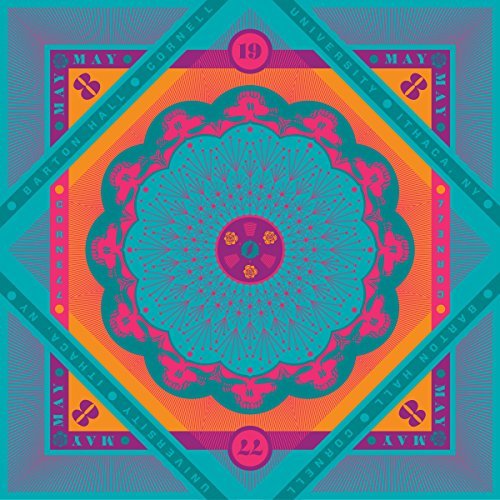
Forty years after it took place and after hundreds of thousands of cassette bootlegs and downloads and streams, the Grateful Dead’s famed May 8, 1977, concert at Cornell University has been officially released as the aptly titled Cornell: 5/8/77.
Featuring some audio spiffing and with none of the generational degradation that comes with clandestine recordings, this version of what many call the Dead’s finest show – is there really any qualifying such a thing? – is indeed quite fine. The sound is pristine. Listeners will feel as if they’re sitting between Bill Kreuztmann and Mickey Hart on the bandstand as the music comes through so loud and clear it sounds as if it was laid down for a studio album.
And God bless the Grateful Dead – even what many consider to be their finest live performance in 30 years of live performance spanning 2,300 live performances is full of imperfections. A false ending on “They Love Each Other.” Muffed vocals on “Row Jimmy.” A monumental vocal faux pas at the beginning of a monumental “Dancing in the Street.” This is what playing a different show every night will get you. And this show is the kind of show that goes a long way toward explaining why Deadheads across the years dropped everything and did virtually anything to see as many shows as they could, for you never knew when a show like this would happen.
On this night, as on so many other good nights, the Dead’s playing is so loose as to be exceptionally tight. Or maybe it’s the other way around. Whichever way it is, Cornell: 5/8/77 features the Grateful Dead firing on all seven cylinders: The Rhythm Devils pounding away, and despite the lack of a standalone “Drums,” propelling the music into the stratosphere. Bob Weir’s arrhythmic rhythm guitar filling the gaps between Jerry Garcia’s shimmering leads. Phil Lesh doing for bass what Garcia does for guitar. Keith Godchaux on piano and various other keyboard instruments adding color to the others’ rainbow of sound. And Donna Jean Godchaux in one of her finer vocal performances, bridging the space between Weir and Garcia’s voices and proving that the Grateful Dead could sing really well when they set their minds to it.
And this show – like much of the 1977 spring tour – features the sound of the pre-hiatus Grateful Dead fading into the ether as the new, more succinct and song-orientated Grateful Dead comes to the fore. Nowhere is this more evident than in the late show run of “St. Stephen”->“Not Fade Away”->“St. Stephen,” as the band in general – and Garcia in particular – employ the grimy, lysergic exploration of its earliest days while simultaneously providing an aural preview of the shinier, less-adventurous approach they would take for the remaining 18 years of their long strange trip.
Packaged in a beautiful turquoise,-pink-and-orange, trifold sleeve that’s better looking than it is functional, Cornell: 5/8/77 is worth seeking out even it you’ve owned various versions of the show in multiple formats. Remastered from Betty Cantor-Jackson’s original soundboard recording, this is the best-sounding version fans are likely ever to hear.
It may or may not be the best Grateful Dead show in history. But it is the most famous. And it serves as a reminder that there was nothing like the Grateful Dead’s May 8, 1977, concert in Ithaca, N.Y.



No Comments comments associated with this post